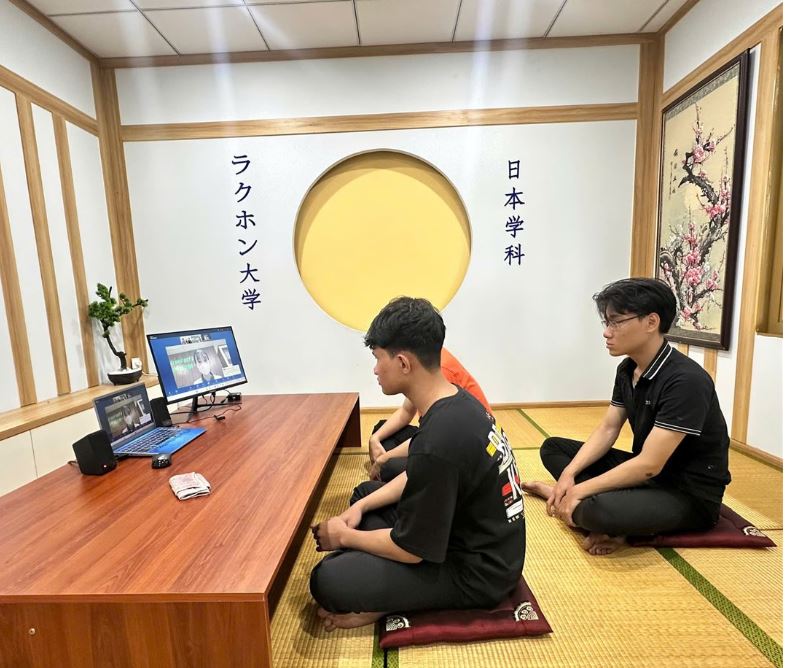Curriculum
CONTENTS
A "Golden Ticket" for Gen Z: Lac Hong University's Vietnam-Japan Program
In a sea of university choices, Lac Hong University's Vietnam-Japan Program emerges as a stands out as an innovative solution. It not only unlocks vast career opportunities within Japanese enterprises but also alleviates financial burdens, especially for disadvantaged students and students from low-income families. LHU's initiative is designed to support career orientation, enhance technical expertise and language proficiency, and promote sustainable employability with Japanese businesses.
Cultural Aspirations and Career Vision
Dong Nai, recognized as Vietnam's "industrial capital," is a magnet for hundreds of Japanese businesses, creating an urgent demand for a workforce proficient in both technical expertise and Japanese language and culture. The story of Tran Kim Ron, a Mechatronics student in the Vietnam-Japan Program from a working-class family in Phu Yen, exemplifies Gen Z's strategic choice to align their studies with real-world demands.
Ron shared that his motivation for choosing the program stemmed from a desire to learn about Japanese technological excellence and a deep admiration for the Japanese people's discipline and professionalism. "Proficiency in Japanese is an indispensable tool for me to absorb the technological and intellectual essence of a global power," Ron affirmed. His decision was not merely a preference but a strategic vision, equipping him with specialized skills alongside language proficiency and an international work ethic.
Notably, this determination was nurtured despite his family's modest financial circumstances. Ron confided that his parents have always been steadfast supporters, encouraging him to pursue this promising program. This narrative challenges the misconception that international cooperation programs are inherently costly. With reasonable tuition fees, LHU enables the children of workers and honest laborers to seize life-changing opportunities without significant financial strain.
Personal Growth Through Culture and Discipline
Pham Tran Phuong Uyen, a Food Technology student in the Vietnam-Japan Program, shared her perspective: "I chose this program because I admire the meticulousness and sense of responsibility inherent in Japanese production processes." Uyen noted that cultural and professional etiquette classes help students develop crucial soft skills, discipline, and adaptability.
The "Dual" Training Model: Integrating Engineering and Culture
The allure of LHU's Vietnam-Japan Program lies in its unique "dual" training model. Students delve deep into core engineering disciplines like mechatronics, technical drawing, and control programming, while also immersing themselves in a distinctly Japanese learning environment. "The most striking feature is the seamless integration of technical skills and language," an LHU student shared. "We are equipped with a solid professional foundation, learn Japanese, explore the culture, and crucially, cultivate the professional work style of the Japanese."
Meticulousness, seriousness, time discipline, and effective teamwork – "golden qualities" sought by all Japanese businesses – are gradually becoming intrinsic to the work ethic of LHU students. The university further facilitates student engagement through vibrant cultural festivals and online discussions with Japanese experts, transforming challenges into motivation and fostering confidence in their pursuit of knowledge.
The Vietnam-Japan Program at Lac Hong University not only meets the human resource requirements of Japanese enterprises in Dong Nai but also demonstrates a strong commitment to sustainable development.

It contributes to SDG 4 (Quality Education) by providing high-quality technical education integrated with foreign language and cultural skills, equipping students with lifelong learning capabilities. The program also supports SDG 8 (Decent Work and Economic Growth) by ensuring decent work for graduates and addressing the human resource needs of Japanese businesses. Furthermore, training students with professional work ethics and a disciplined mindset contributes to fostering sustainable practices within the industry.
This is particularly relevant to SDG 17 (Partnerships for the Goals), as LHU establishes strategic partnerships with Japanese enterprises. This collaboration not only secures employment opportunities for students but also serves as a bridge for knowledge transfer and the dissemination of professional work culture, creating a sustainability impact on regional educational and economic development.
From the learning environment to career pathways and corporate collaboration, students in the Vietnam-Japan Program are comprehensively prepared to enter the international labor market.


